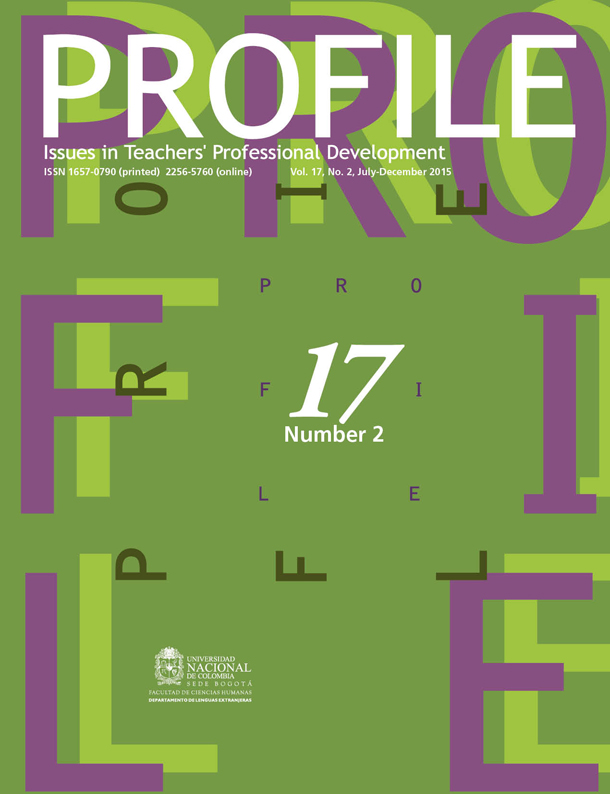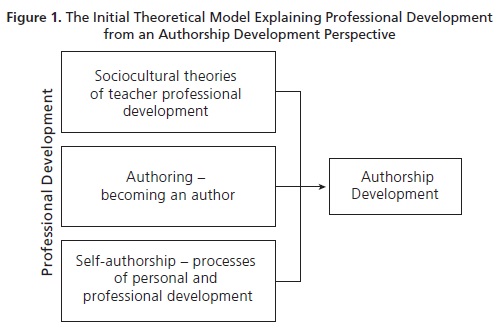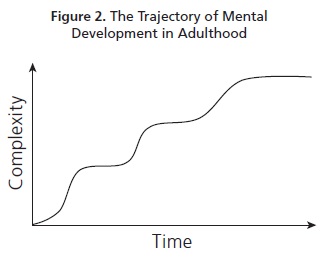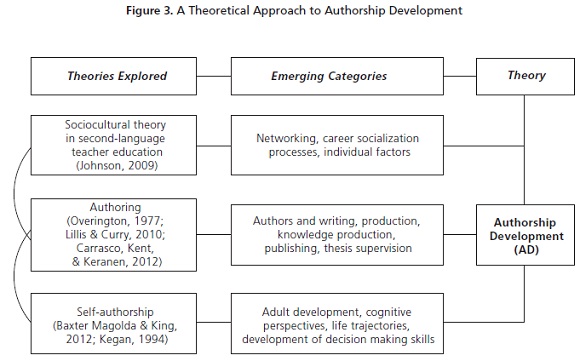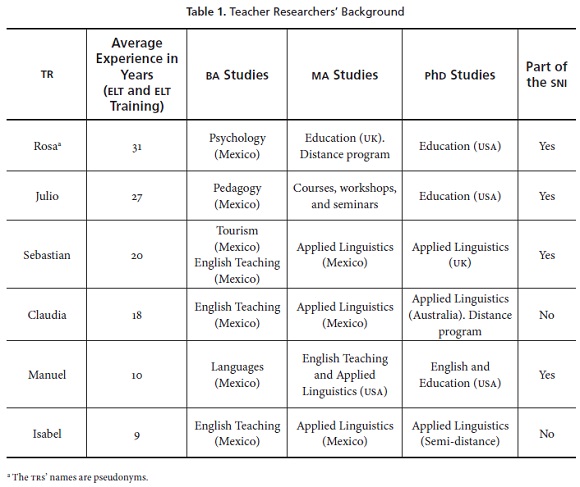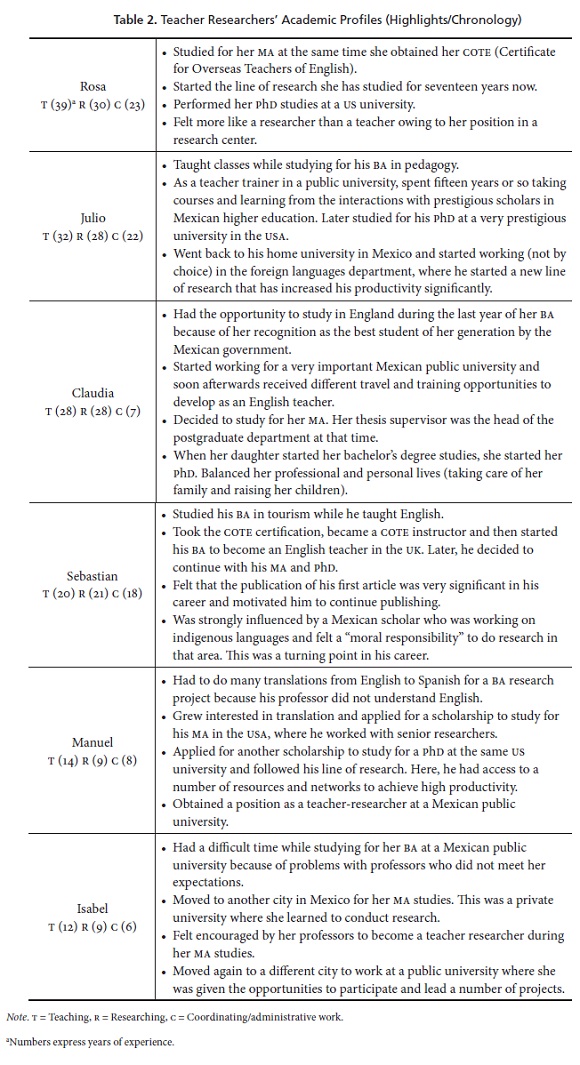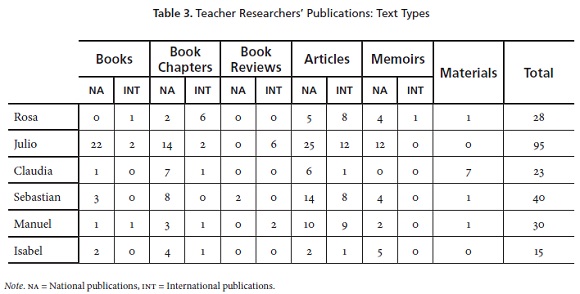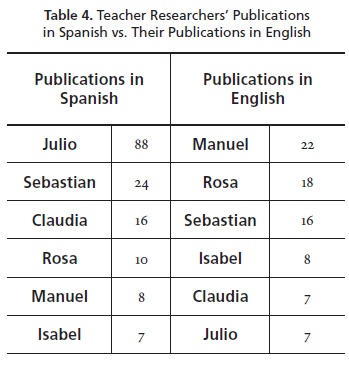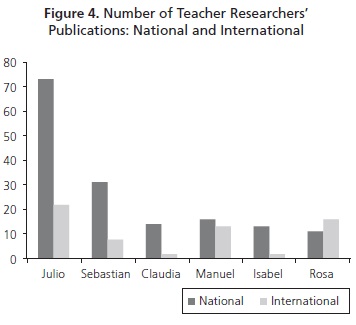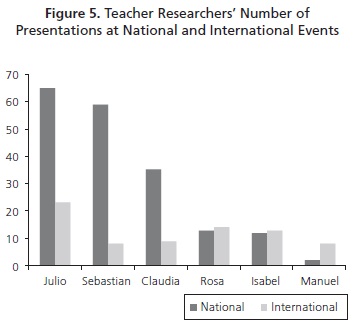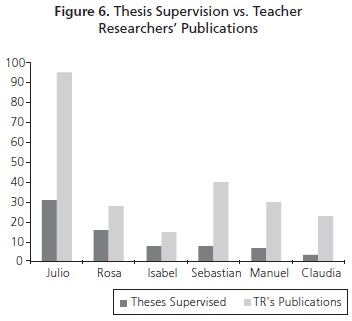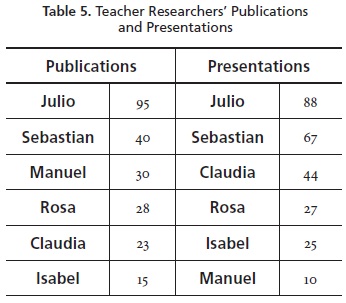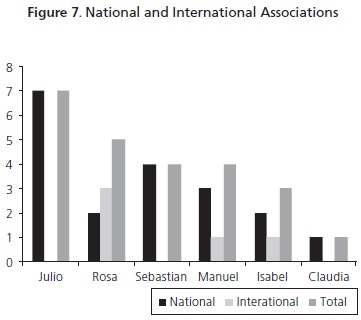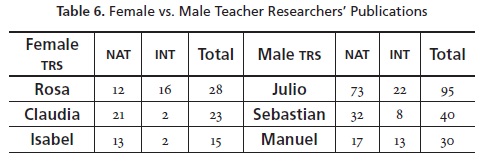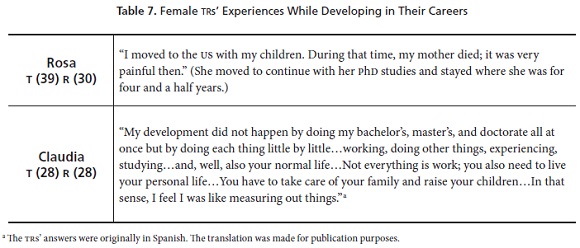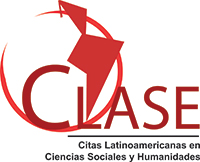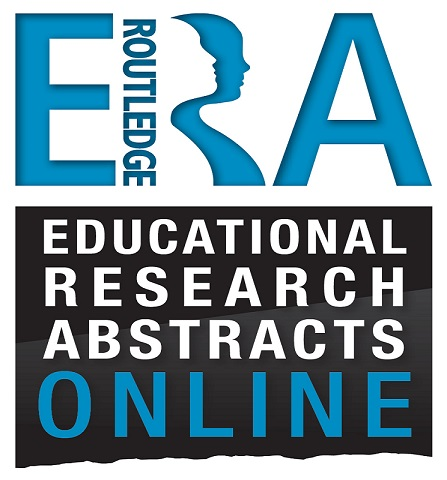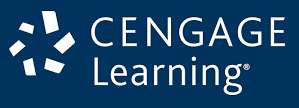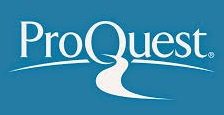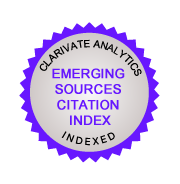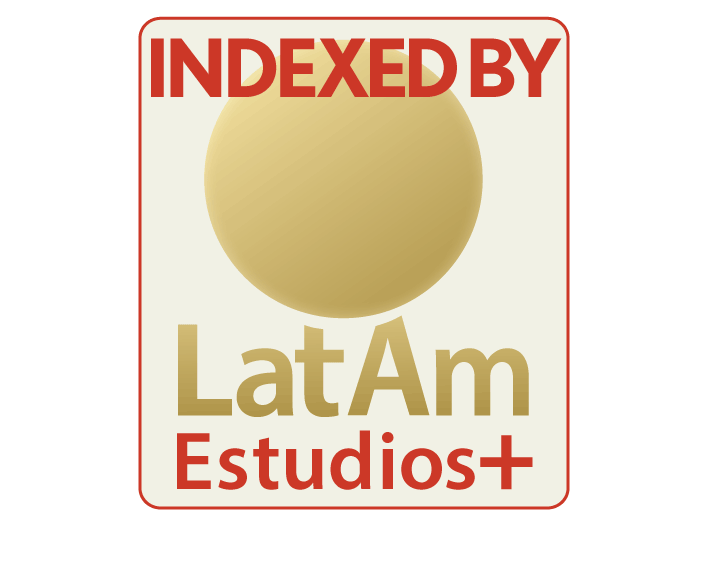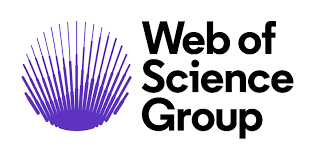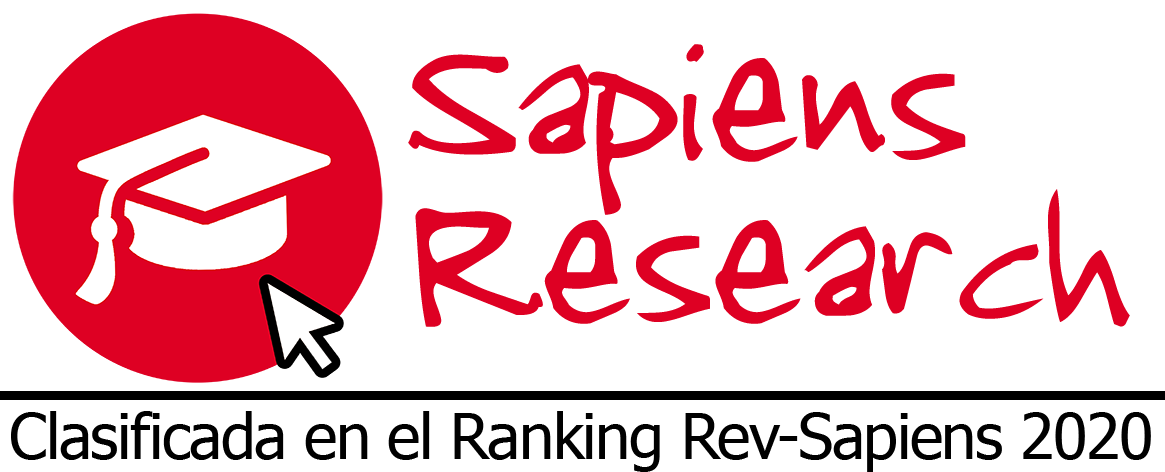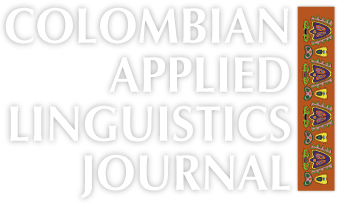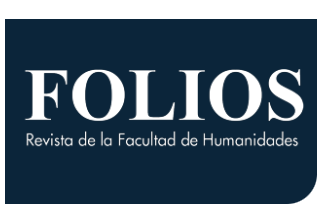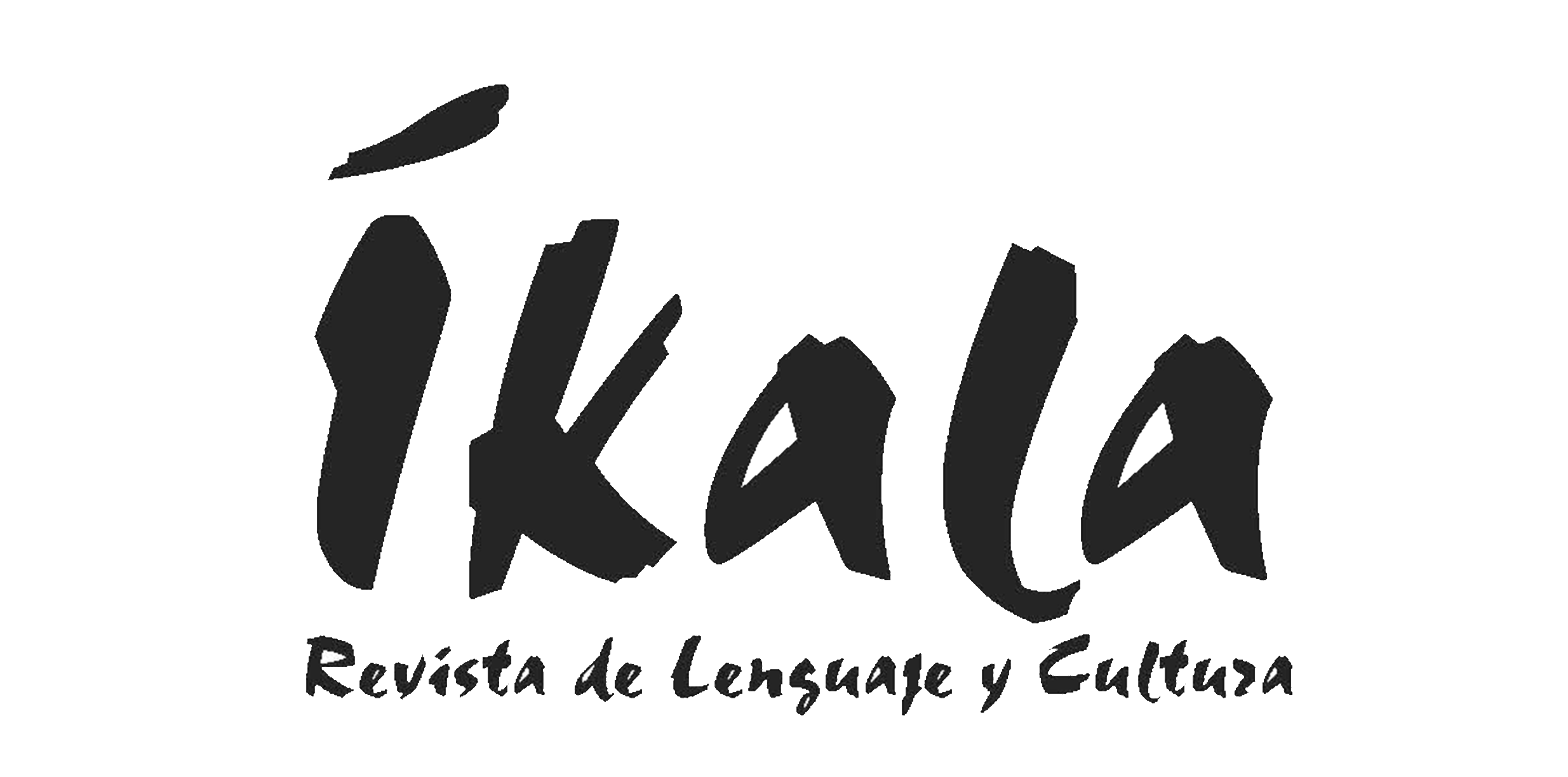Exploring Authorship Development Among Mexican EFL Teacher-Researchers
DOI:
https://doi.org/10.15446/profile.v17n2.44441Keywords:
Authoring, authorship development, self-authorship, sociocultural perspective in second-language teacher education (en)This article presents a multi-theoretical model to address processes of authorship development in the English as a foreign language teaching profession. Working within a sociocultural perspective of second-language teacher education, the authors examined six experienced nonnative English-speaking teacher-researchers. Perceptions of their key moments in the profession were analyzed using a mixed-method approach that combined document analysis with personal narratives. The findings indicated that both authoring (products and activities in their profession) and self-authorship (transformational processes throughout their careers) contributed to constructing these English as a foreign language professionals as scholars.
En este artículo se presenta un modelo multiteórico y multinivel para identificar el proceso en el que los autores se desarrollan en el área de la enseñanza del inglés como lengua extranjera, proceso identificado como desarrollo de la autoría. Este modelo se desarrolló bajo una perspectiva sociocultural de la formación de profesores que presenta una muestra de las percepciones de seis profesores investigadores mexicanos en el área de inglés como lengua extranjera. Se utilizó un método mixto que combinó el análisis de documentos con narrativas personales. Los resultados de esta investigación indicaron la presencia de momentos significativos de su autoría (productos y actividades) y su auto-autoría (procesos de transformación), que contribuyeron a la construcción del desarrollo de la autoría de estos profesores-investigadores.
https://doi.org/10.15446/profile.v17n2.44441
Exploring Authorship Development Among Mexican EFL Teacher-Researchers
Exploración sobre el desarrollo de la autoría en los profesores-investigadores de inglés como lengua extranjera
Eva Estefania Trujeque Moreno*
Fátima Encinas Prudencio**
Benemérita Universidad Autónoma de Puebla, Puebla, Mexico
Maria Thomas-Ruzic***
University of Colorado, Boulder, USA
*evatrujeque@gmail.com
**fatimaencinas@gmail.com
***maria.thomas-ruzic@colorado.edu
This article was received on July 16, 2014, and accepted on January 3, 2015.
How to cite this article (APA 6th ed.):
Trujeque Moreno, E. E., Encinas Prudencio, F., & Thomas-Ruzic, M. (2015). Exploring authorship development among Mexican EFL teacher-researchers. PROFILE Issues in Teachers’ Professional Development, 17(2), 43-62. https://doi.org/10.15446/profile.v17n2.44441.
This is an Open Access article distributed under the terms of the Creative Commons license Attribution-NonCommercial-NoDerivatives 4.0 International License. Consultation is possible at http://creativecommons.org/licenses/by-nc-nd/4.0/.
This article presents a multi-theoretical model to address processes of authorship development in the English as a foreign language teaching profession. Working within a sociocultural perspective of second-language teacher education, the authors examined six experienced nonnative English-speaking teacher-researchers. Perceptions of their key moments in the profession were analyzed using a mixed-method approach that combined document analysis with personal narratives. The findings indicated that both authoring (products and activities in their profession) and self-authorship (transformational processes throughout their careers) contributed to constructing these English as a foreign language professionals as scholars.
Key words: Authoring, authorship development, self-authorship, sociocultural perspective in second-language teacher education.
En este artículo se presenta un modelo multiteórico y multinivel para identificar el proceso en el que los autores se desarrollan en el área de la enseñanza del inglés como lengua extranjera, proceso identificado como desarrollo de la autoría. Este modelo se desarrolló bajo una perspectiva sociocultural de la formación de profesores que presenta una muestra de las percepciones de seis profesores investigadores mexicanos en el área de inglés como lengua extranjera. Se utilizó un método mixto que combinó el análisis de documentos con narrativas personales. Los resultados de esta investigación indicaron la presencia de momentos significativos de su autoría (productos y actividades) y su auto-autoría (procesos de transformación), que contribuyeron a la construcción del desarrollo de la autoría de estos profesores-investigadores.
Palabras clave: autoría, auto-autoría, desarrollo de la autoría, perspectiva sociocultural en la formación de profesores de una segunda lengua.
Introduction
English as foreign language teacher researchers (EFL TRs hereafter) in Mexico represent a small but growing number of scholars in the field of language teaching. They participate in a variety of academically related activities in their profession, including teaching, researching, coordinating, publishing, presenting, developing curricula, designing materials, assessing students’ competences, and supervising thesis projects. They develop professionally through their engagement in these activities in academia, and they become authors. This study’s main purpose was to explore and trace these processes in EFL TRs’ careers. Drawing from the work on authoring and self-authorship, we propose a new theoretical notion: authorship development, which we use and develop in our analysis.
A few studies related to this topic have been carried out in recent years. However, many of them have investigated contexts such as authorship and publication practices in the social sciences (Bebeau & Monson, 2011), authorship and collaborative research (Welfare & Sackett, 2010), the authorship construction of young scientists in Mexico (Carrasco, Kent, & Keranen, 2012), and self-authorship as a meaning-making stage in adulthood involving a balance between “subject” (elements of knowing that we are identified with and embedded in) and “object” (elements that we can reflect and operate on) (Baxter Magolda & King, 2012; Kegan, 1994). Some of these have shed new light on scientists’ trajectories and their productivity, whereas others have focused more on developmental theories in adulthood. Ramírez-Romero (2011), studying Mexican EFL TRs’ professional development trajectories, reports a lack of research on workplaces, classroom practices, productivity, and the processes involved in developing as an author. Because research activities have recently become an indicator of EFL TRs’ professional development (Richards, 2011), the issue of EFL TRs’ increasing productivity has been receiving more attention in the literature (Reyes Cruz & Hernández Méndez, 2014).
This study proposes a multi-theoretical model to address authorship development (hereafter AD). The model was used to explore six experienced Mexican teacher-researchers’ perceptions about their key moments in the profession. From this sociocultural perspective, the present study investigates what being an “author” in the profession means to individual scholars.
Figure 1 shows the initial multi-theoretical model created in this study to describe and analyze EFL TRs’ professional development from an AD perspective. Theories associated with teacher professional development from a sociocultural perspective were linked with current theoretical thinking on processes connected to becoming an author and theories that seek to explain the adult cognitive development referred to as self-authorship to create a theory of authorship development.
Theoretical Framework
A Sociocultural Approach to Professional Development in English Language Teaching
Teacher education has been transforming and moving from training towards development and adopting a more sociocultural perspective, after Vygotsky (1978) and the many scholars who worked from a Vygotskian perspective. From this stance, cognitive development in human beings is subject to “cultural practices and circumstances of their communities” (Rogoff, 2003, p. 3).
The integration of cognitive, developmental perspectives with sociocultural perspectives brings together a framework that allows us to trace how TRs learn. Using this new, integrated frame, AD in the profession can be viewed as an individual but also a social developmental process that involves participation and networking in the English language teaching (ELT) community.
Authorship Development (AD): Authoring and Self-Authorship
Developing as an author involves learning from specific moments in one’s career, whether as a foreign language teacher or another type of professional. This study proposes the term AD to refer to the cumulative authoring and self-authorship experiences that shape ELT TRs’ professional development. The term authorship has been defined and/or described from different perspectives. It was initially viewed as a way to produce scientific knowledge in academia and mainly focused on what research writers could produce (e.g., Carrasco & Kent, 2011; Lillis & Curry, 2010; Overington, 1977; among others). Authorship has also been related to the rhetorical features that a writer must manage in order to become an author (Kellogg, 2008). Another perspective is offered from an adult development angle that is concerned with self-authorship, a high-level thinking order in adulthood, a concept developed by Baxter Magolda and King (2012) drawing from Kegan’s (1994) and Kegan and Lahey’s work (2009).
The Self-Authoring Mind
The development of any writer has to do with his/her experiences in the world. The extent to which authors develop in different disciplines is also affected by their adult development. Kegan (1994) explored humans’ mental complexity in order to depict how people make sense of the world and constructed a theoretical framework to explore the trajectory of mental adult development that involves a self-authorship construction. Kegan and Lahey (2009) draw the development of mental complexity as shown in Figure 2.
In their theory of adult development, Kegan and Lahey (2009) identify five stages or orders of mind, four of which are generally developed in adulthood. These are the instrumental mind, the socialized mind, the self-authoring mind, and the self-transformative mind. In the instrumental stage, adults see their own impulses as primal, are unable to see others’ perspectives, and cannot reflect upon themselves or identify patterns in their personalities. At this level, adults are subject to their desires. In the socialized mind, individuals are aware of the influence of others’ perspectives in their lives as well as their needs. They are capable of putting their individual interests under a reflective lens, yet they also rely on others to generate answers. Then, when they reach a self-authoring mind, adults possess the skills to differentiate themselves from others, evaluate their own value systems, and shape their identities. At this point, individuals are able to manage conflict and achieve leadership. Finally, adults in the self-transformative order, a very small minority, are able to reflect on the limits of their own work. They can recognize what is in some way partial or incomplete in their work or perspectives and make space for revision and development. Furthermore, they grasp the incompleteness of systems as a fundamental part of their own construction.
Authorship Development Via Networks
Networks contribute to TRs’ development through socialization and exposure to new contexts in which they continue learning and developing (Higgins & Kram, 2001). Johnson (2009) suggests that we “include teacher’s networks” in teacher education programs: a social network and a professional one (p. 6).
Networks are relevant in a number of ways. Teachers of English as a foreign language share a range of professional practices (Wenger, 1998) and communication genres as members of a professional organization. The members of the Mexican EFL community tend to follow certain paths in their professional development.
EFL TRs often publish a variety of text types such as research proposals, reports, assignments, tests, projects, articles, biographies, memoires, and textbooks and are expected to manage the rhetorical features of each of these. Publishing implies a consolidating stage in their lives and therefore part of a significant career transition. Career transitions are opportunities to develop networks (Ibarra, 1999) and are hence associated with key productive moments in TRs’ careers. AD, then, is influenced by the TRs’ establishment of networks.
Figure 3 summarizes the theories explored in this study and shows how sociocultural theory serves as a frame to explore AD. In particular, the authors made use of two specific notions. Authoring (products and activities) was recognized as an AD component on the “professional” side of TRs’ lives, and self-authorship (transformational and developmental processes throughout their careers) was found on the “personal” side. Both concepts helped us to trace AD processes in TRs’ lives.
Authors’ Apprenticeship Moments
Apprenticeship theory (Lave, 2011) claims that all individuals are apprentices of their own evolving practices, and apprenticeship is subject to social, historical, and cultural contexts that influence how an individual makes meaning. In the EFL teaching profession, becoming an author involves a variety of key teaching and learning processes. These encompass the persuasive rhetorical features of English, developing cognitive skills, negotiating meanings, socializing knowledge, interacting with experts, participating according to the sometimes unspoken rules of the ELT academia, and identifying oneself as a professional writer, among others. In the process of becoming authors, TRs develop in both the professional and personal domain to meet the performance standards of the profession. Thus, TRs’ experiences as apprentices may bring interesting insights into this matter.
Language and Literacy Contexts of ELT TR Professionals in Mexico
In Mexico, scholars from different disciplines are expected to manage the pressure of publishing demands. Local publishing practices are affected by global policies (Lillis & Curry, 2010). Therefore, in this knowledge society era, many scholars live by the idea of “publish or perish” if they want to obtain funds and belong to elite research circles such as the SNI, the National Organization of Researchers of the Consejo Nacional de Ciencia y Tecnologia (CONACYT). In the Mexican ELT community, becoming an author has recently turned into an indicator of development in the profession (Ojeda, 2012).
The professional development of a nonnative English teacher in Mexico is a particularly complex and ongoing process related to the acquisition of high proficiency across a range of discourse practices and literacy in two languages, for instance, language proficiency, content and contextual knowledge, specialized cognitive knowledge, theory development (Richards, 2011), and training and reflective skills (Richards, 1989; Singh & Richards, 2006; Wallace, 1991). The professional development of Mexican ELT scholars has been influenced by the professional standards of teachers of English to speakers of other languages (TESOL), driving an increase in the demands of both training and developmental programs. Today, most BA graduates from EFL teaching programs in Mexico need to have at least a C1 (Common European Framework of Reference) in English and possess the methodological skills to teach the language effectively. Additionally, ELT programs encourage teachers to demonstrate their research skills when developing research proposals (Sayer, 2007). Thus, EFL teachers must meet different teaching and learning demands in a range of social contexts.
EFL scholars have a privileged position because English is the international language for social interaction and publication (Lillis & Curry, 2010); the status and currency of English give TRs access to a number of other contexts and disciplines. For example, there are ELT TRs in Mexico who publish with scholars from different fields of knowledge, such as Carrasco et al. (2012). These scholars must also adapt to the challenges of being nonnative speakers (Crawford, 2010; Mora Pablo, 2013).
Reaching national and international audiences is one of the reasons Mexican ELT teacher-researchers publish in both English and Spanish (as reported in this study). Ramírez-Romero (2010, 2011) states that most ELT publications in Mexico are in Spanish (56%), followed closely by English (40%). Being able to write and publish in these two languages gives these TRs opportunities to do research and establish networks.
In summary, ELT TRs need to continuously to adapt and develop in order to meet or exceed professional expectations for teaching and scholarship—locally as well as nationally and internationally.
Research Questions
The questions that guided this study were the following: What do key moments in Mexican EFL teacher-researchers’ professional development reveal about their development as authors? What evidence can illuminate these participants’ self-authorship development? What is the relationship between these teachers’ AD and their participation in ELT networks and other fields?
Method
The present study is a collective case study that was used instrumentally (Stake, 1995) to trace authorship development in the professional development trajectories of six Mexican EFL scholars. A number of cases were viewed as part of a “bounded system over time through detailed, in-depth data collection involving multiple sources of information rich in context” (Creswell, 1998, p. 61). A mixed-method research design and two instruments were used to examine experienced EFL teacher-researchers’ authoring and self-authorship, respectively, content analysis of TRs’ curricula vitae and interviews. These instruments guided the data collection process to identify key professional development moments that revealed AD in the career from the perspectives of authoring (Lillis & Curry, 2010; Richards, 2011), self-authorship (Baxter Magolda & King, 2012; Kegan, 1994), and networking (Higgins & Kram 2001; Johnson, 2009). Thus, the data obtained were used complementarily (quantitative and qualitative) to develop interpretations (Creswell, 2003).
The CVs provided by these scholars were professional documents that contained information about their identities, schooling, publications, presentations, memberships, associations, and distinctions, among other relevant aspects and products of their academic lives. The analysis of the CVs aimed to locate authoring as indicators of the TRs’ productivity.
Personal narratives from interviews were used to delve into key moments in the scholars’ careers that revealed self-authorship. Narrative inquiry makes possible an analysis of teacher thinking because it leads to opening teachers’ mental lives (Johnson, 2009) and regarding teachers as “knowing professionals or agents of change” (Johnson, 2009, p. 1). Narratives in this context are viewed as forms of mediation, verbalization and systematic examination from a sociocultural perspective (Johnson & Golombek, 2002, 2011) as well as products of social interaction immersed in defined cultural, historical, and social settings. Narratives also offered the opportunity for us to identify similarities and differences among TRs’ career paths and to study what was revealed about their AD.
Procedure
The instruments were chosen and designed, piloted, and then redesigned. First, the number of participants and the selection criteria described above were defined. Experienced TRs who actively publish are all busy scholars with demanding schedules. Thus, from twelve initial candidates, only six were included in the study. These participants sent their CVs and were interviewed about their professional development in a twenty-minute interview via Skype. Spanish was the language used for the narrative interview in order to create an atmosphere of confidence and comfort as well as to generate rapport with the participants.
Participants
Three female and three male Mexican EFL TRs participated in this study. At the time of the study, the participants were active contributors to the ELT discourse community in Mexico and prominent Mexican TRs working at public universities in different states of Mexico. They were acknowledged scholars with different distinctions. The three male TRs were part of the Sistema Nacional de Investigadores (SNI), the National Organization of Researchers of the Consejo Nacional de Ciencia y Tecnologia (CONACYT), which acknowledges the contributions of high-level researchers to science and technology. Ramírez-Romero (2009, 2010, 2011) reported five academics with this recognition in 2009 and twenty in 2011 (see Table 1). This indicator matches the growing number of investigations in the area.
All of the participants held a PhD degree and actively published in English; most of them also published in Spanish. They were involved in a variety of activities such as researching, lecturing, creating materials, training teachers, developing curricula, and tutoring. Furthermore, they belonged to different national and international networks and associations such as RECALE (an academic network on foreign languages), RILE (a research network on foreign languages), MEXTESOL (the Mexican teachers’ association of English as a second language) and TESOL (Teachers of English as a Second Language), as well as other professional associations.
TRs’ Roles
The participants in this study had held a number of positions and consequently a number of responsibilities in different education programs. All had taught English and/or content classes for pre-service teachers in the area of ELT, led research projects, and coordinated a variety of programs in higher education. Table 2 presents an overview of the participants in order of their time in the field.
Findings
AD in TRs’ Professional Development: Authoring
The TRs’ authoring was identified through their products and activities in the profession. What these scholars created or produced during their careers, such as designing, applying, and assessing teaching materials, on-site and distance courses, projects, supervising theses, and research publications, are the core of EFL TRs’ authoring. The CVs explored in this study provided data mostly on the number of the TRs’ national and international publications and presentations. These were considered national when they were published in journals, publishing houses, or universities in Mexico and international if the TRs’ products were published in a foreign organization or institution.
Publications
Publication data available through the CVs offered information about what the TRs’ had published throughout their careers. The results indicated that the publication rates of the EFL TRs in this study were high compared with the national average of 1.2 publications per author per year (Ramírez-Romero, 2011). In addition, the data in this study indicated that the TRs were likely to have published a variety of text types in both languages, English and Spanish. These were books, book chapters, book reviews, articles, memoirs, and materials. The results from this exploration are shown in Table 3.
A number of patterns emerged when analyzing the TRs’ authoring in terms of their publication results. The TRs in this study publish mostly nationally, but some also publish internationally. Either in national or international publications, their authoring was developed in two languages: Spanish and English. Table 4 shows the number of publications that the TRs had in the two languages.
Table 4 shows the number of publications the TRs had in Spanish and in English in order of highest to lowest number. The results indicated that Manuel and Rosa had published more in English while Julio and Sebastian had published more in Spanish.
The TRs’ publications were classified as national or international according to the origin of the journals and/or publishing houses they wrote for. Figure 4 shows the TRs’ interactions with national and international contexts in terms of publication.
The results in Figure 4 indicate that nearly all of the participants had more national than international publications with the exception of Rosa, the only female among the three with major international productivity. In the case of the male participants, their productivity was greater than that of the female TRs. Julio and Sebastian had greater international productivity in contrast to their national publications, whereas Manuel’s international and national productivity were quite similar. The numbers of males’ and females’ national and international publications suggest gender differences connected to authoring in the field, at least in this small sample.
Presentations
Giving talks in national and international forums that were mostly concerned with foreign languages and/or education was a way of socializing research for most of these TRs. Presenting was another experience in the profession that all of the participants in this study had engaged in both nationally and internationally; we thus viewed presenting as an authoring component. The data shown in Figure 5 about presentations were collected from the CVs.
The results show that Julio, Sebastian, and Claudia were the TRs with the most presentations. Julio, Sebastian, and Claudia had presented significantly more in national forums, whereas Manuel and Isabel, the youngest TRs, had more international presentations.
Thesis Supervision and TR’s Productivity
The data collected in this research suggested a connection between TRs’ thesis supervision and their productivity. Being a thesis supervisor was also an interesting stage in TRs’ lives because many of them had coauthored articles with their students. Figure 6 illuminates this connection.
Figure 6 indicates that Julio and Rosa supervised the most theses. These scholars show comparatively high productivity overall and the most years of experience as scholars.
During the interviews, some TRs reported a connection between the theses they had supervised and their productivity. For example, Rosa, the most experienced TR, highlighted these apprenticeship experiences during her interview. Publishing with her students was a meaningful authoring experience in her academic life. An excerpt from her interview is shown below:
I tutored my student in that topic, which was the same topic of my PhD thesis, and after she finished, I told her that she had to publish. Then, what I gave to her, the idea of publishing...that expanded her horizons, and now she publishes on her own...she has three or four articles, one of them in the MEXTESOL journal...That was the first time; then, I liked it so much that I continued doing it. . . .
Right now, I am working on that, writing a book with my students. I think that we should do this more...once you give this to your students, they don’t let it go, such as this student who continues publishing.1
Julio also shared Rosa’s thesis supervision experience; they viewed thesis supervision as a type of shared authoring experience that in some cases resulted in coauthored publications.
The Journey Toward Self-Authorship: Summary Of TRs’ Key Moments in the EFL Profession
How these TRs made sense of the key moments in their careers indicated how their contexts and decisions had allowed them to develop and to become authors in the profession. Evidence of this was the number and variety of turning points, or what we would like to call “inflection” moments, that were reported in the interviews (see Table 2). That is, the TRs’ career paths were influenced by a variety of contexts through their study and work experiences. Rosa, Julio, and Sebastian, for example, are experienced TRs who earned their BAs in areas outside of English teaching per se, respectively, psychology, pedagogy, and tourism. Rosa and Sebastian were teaching English2 during their BA studies and then entered into the area of foreign languages. Julio started a dual career, one in pedagogy and the other in foreign languages, when as a new PhD, he was invited to join the foreign languages department at the public university where he was working. The youngest TRs, Manuel and Isabel, built their ELT backgrounds on their BA studies in ELT and completed their doctorates at relatively early ages.
The power of networking in the EFL profession is evident when analyzing the TRs’ CVs. This professional document showed that what these TRs do in the profession is cumulative, though not precisely related to the time they have been in the profession. Table 5 shows the TRs in order of their total number of publications and presentations—national and international.
Networking: National and International Participation
Developing networks via national and international associations is considered an indicator of TRs’ disciplinary growth as stated by Ramírez-Romero (2009) in his report on the state of the art in the field. The types of networks TRs belong to range from ELT associations, research groups, editorial participations, and other types of activities connected to other fields of study. However, only their memberships in specific official associations were taken into consideration in Figure 7 because these were explicitly addressed in a specific section of the TRs’ CVs.
Figure 7 shows that Julio, Sebastian, and Manuel were the ones with more memberships to national associations, whereas Rosa, Manuel, and Isabel were members of at least one international association.
Discussion
TRs’ Authoring: Productivity
The TRs who had earned their MA or PhD degrees in English-speaking countries were likely to have more publications in English. Those whose work was primarily national and local (i.e., Julio and Claudia) had published more in Spanish than in English, although publishing in Spanish did not necessarily mean only national participation. Rosa’s publications in Spanish were in other countries in Latin America in addition to Mexico. Thus, the TRs’ productivity appears to be related to the institutions where they studied and the networks they established when they lived in other countries or based on the nature of their research interests. Being able to publish in two languages seemed to be a powerful tool for gaining access to a variety of discourse communities in ELT and other fields.
Self-Authorship: Becoming Teachers, Researchers, and Authors
Identifying as a teacher, researcher, and author is part of what the TRs reported when asked about how they perceived themselves in the profession. Overall, their answers revealed that their teaching and researching experiences had transformed them. Although their backgrounds are different, all of them had gone through processes of change that influenced the ways they felt and thought about their careers (see Table 2).
The TRs’ professional development was immersed in dynamic processes in a range of different contexts. These results also show that the TRs identified as teachers in the early years of their careers and later as teacher educators and/or researchers. On this continuous journey, a feeling of consolidation and career satisfaction seemed to appear after roughly a decade of researching, as observed with Isabel and Manual (TR6 and TR5) (see Appendix). In this process, the TRs viewed their authoring research as key in their consolidation in the EFL profession.
Different Generations and Different Contexts
The early specialization of Sebastian, Manuel, and Isabel can be associated with the development of the field in recent decades and can be viewed as a response to the higher demands of specialization that we see today. Nevertheless, for all of the TRs in the study, completion of the doctorate was followed by an increase in the number of publications. In addition, the TRs’ national and international schooling contexts, the types of programs in which they had studied, and the networks they had established represented the most outstanding factors that contributed to their high levels of productivity in the profession. The TRs in this study who had studied in PhD programs offered by a foreign university had to travel or live in an English-speaking country to do their research; the data show that their internationally earned doctorates had implications for the forums in which they later published. In sum, the contexts in which these TRs studied and worked also defined the people they met, which allowed them to interact with specific communities. This social dimension in the TRs’ lives can be viewed as having a crucial impact on the construction of their AD.
Institutions and Networks: National and International Settings
We can assume that the institutional culture in which these TRs had worked and studied was influential in their professional development. As was mentioned earlier, at the time of this study, all six TRs worked at public universities in Mexico, and these institutions provided them with the opportunities as well as expectations to continue developing in the profession. In addition, all had the opportunity to study at English-speaking institutions in the USA, the UK, or Australia during their doctorates. Such study allowed them access to a number of research tools and opportunities to socialize with well-known senior researchers in high-productivity cultures.
TRs’ connections with national and international networks were thus also influenced by the places where they had worked, studied, and presented. Interactions with other members of the discourse community helped to forge collaborations, especially following their MA studies and developing further during their PhD programs. The two TRs, Julio and Manuel, with the most publications cited networking as key in their careers. Manuel, during his interview, stated, “They [networks] will be very valuable for my future research projects.” This statement suggests that networking in the EFL profession allows TRs to participate in national and international contexts. In this regard, networks were also identified as reciprocal (Ibarra & Deshpande, 2007); that is, the more networks the TRs belonged to, the more collaboration and productivity they and the other network members could have.
Gender
Although it was not a focus of the study, the discrepancy in terms of publication rates for the male and female TR participants is noted and discussed briefly below.
The productivity of the three men was strikingly higher than that for the three women. For purposes of comparison, consider three TR pairs matched in terms of their approximate lengths of professional experience in years: Rosa T (39) R (30) and Julio T (32) R (28); Claudia T (28) R (28) and Sebastian T (20) R (21); and Manuel T (14) R (9) and Isabel T (12) R (9). Rosa’s number of publications (28) was less than 30 percent of Julio’s (95). In the second pair, Claudia had 23 publications and Sebastian had 40. Finally, Manuel and Isabel, the youngest TR pair, also showed this tendency; Manuel had 30 publications, but Isabel had 15, half of Manuel’s number (see Table 6).
This discrepancy between the male and female TRs’ numbers of research products may be attributable to various sociocultural factors, specifically relationships and caregiving responsibilities in their everyday or professional lives, as indicated in the interview data shown in Table 7.
Rosa and Claudia spoke of balancing time between their families and their careers. Isabel, the youngest TR, did not mention parent or child issues. From Rosa’s and Claudia’s perspectives, motherhood, caregiving and other women’s social roles were viewed as influences on their productivity and professional trajectories over time.
Conclusions
Our findings and analyses indicate that AD is an inclusive framework that can be used for understanding professional development in TRs’ lives. Facts from this study show interesting patterns across individual EFL teachers’ professional development related to their participation in academic professional communities. Their participation also provided key information about what AD looked like for each of them. Differences among the participants in terms of gender and experience related to their amounts of authoring in the profession. The CVs and the analyses of personal narratives helped to uncover how teacher-researchers’ professional and personal lives converge and shape, and are shaped, by their AD.
Most of the TRs viewed themselves as authors in the profession when they carried out research. They perceived publishing in English and Spanish as key moments, or achievements, in their emergence as authors. Thesis supervision, networking, and coauthoring with students and peers were viewed by some of these scholars as key authorship development moments. Thus, the authoring component in the profession was viewed as an indicator of participation and additionally of development.
The male participants in this study had higher productivity (in terms of publications) than did the females. This gender-associated result provides additional evidence that adults’ sociocultural histories and participation need to be taken into account in their professional development, and it represents a new area of interest for the authors’ further explorations into AD.
The two concepts used to address the concept of AD were authoring and self-authorship. In this study, authoring was used to refer to a more quantitative and objective process that was measured or regulated in terms of TRs’ productivity in the profession through their developed materials and curricula, published research and text production, and thesis supervision as well as presenting papers and establishing networks with members of academic communities. Self-authorship was used as a personal and developmental process related to maturity and consolidation both professionally and personally. The interrelationships of these processes over time in the profession were defined as AD.
These two dimensions of AD helped us to describe what becoming and being an author looked like for the EFL professionals who were involved in the study. On one side, there were self-transformation and consolidation moments in these TRs’ lives that fell on the personal and professional borders, and these moments were key in constructing the TRs’ self-authorship. On the other side, productivity in the profession was viewed as the authoring component of AD, composed of products and activities in the profession. Together, the findings argue for the relevance of AD as a useful construct for exploring and perhaps contributing toward development in teacher-researchers’ lives.
1The TR’s answers were originally in Spanish. The translation was made for publication purposes.
2Because of their considerable English levels.
References
Baxter Magolda, M. B., & King, P. M. (2012). Assessing meaning making and self-authorship: Theory, research and application. San Francisco, CA: The ASHE Higher Education Report.
Bebeau, M. J., & Monson, V. (2011). Authorship and publication practices in the social sciences: Historical reflections on current practices. Science and Engineering Ethics, 17(2), 365-388.
Carrasco, A., & Kent, R. (2011). Leer y escribir en el doctorado o el reto de formarse como autor de ciencias [Reading and writing during doctoral studies or the challenge of becoming an author in the sciences]. Revista Mexicana de Investigación Educativa, 16(51), 1227-1251.
Carrasco, A., Kent, R., & Keranen, N. (2012). Learning careers and enculturation: Production of scientific papers by PhD students in a Mexican physiology laboratory: An exploratory case study. In C. Bazerman, C. Dean, J. Early, K. Lunsford, S. Null, P. Rogers, & A. Stansell (Eds.), International advances in writing research: Cultures, places, measures (pp. 335-351). Fort Collins, CO: The WAC Clearinghouse and Parlor Press. Available at http://wac.colostate.edu/books/wrab2011/.
Crawford, T. (2010). ESL writing in the University of Guanajuato: The struggle to enter a discourse community. Guanajuato, MX: Universidad de Guanajuato.
Creswell, J. W. (1998). Qualitative inquiry and research design. Thousand Oaks, CA: Sage.
Creswell, J. W. (2003). Research design: Qualitative, quantitative, and mixed methods approaches. Los Angeles, CA: Sage.
Higgins, M. C., & Kram, K. E. (2001). Reconceptualizing mentoring at work: A developmental network perspective. Academy of Management Review, 26(2), 264-288.
Ibarra, H. (1999). Provisional selves: Experimenting with image and identity in professional adaptation. Administrative Science Quarterly, 44(4), 764-791.
Ibarra, H., & Deshpande, P. H. (2007). Networks and identities: Reciprocal influences on career processes and outcomes. In H. Gunz & M. Peiperl (Eds.), Handbook of career studies (pp. 268-283). Thousand Oaks, CA: Sage. https://doi.org/10.4135/9781412976107.n14.
Johnson, K. E. (2009). Second language teacher education: A sociocultural perspective. New York, NY: Routledge.
Johnson, K. E., & Golombek, P. R. (2002). Teachers’ narrative inquiry as professional development. New York, NY: Cambridge University Press.
Johnson, K. E., & Golombek, P. R. (2011). The transformative power of narrative in second language teacher education. TESOL Quarterly, 45(3), 486-509.
Kegan, R. (1994). In over our heads: The mental demands of modern life. Cambridge, MA: Harvard University Press.
Kegan, R., & Lahey, L. L. (2009). Immunity to change: How to overcome it and unlock the potential in yourself and your organization. Boston, MA: Harvard Business School Press.
Kellogg, R. T. (2008). Training writing skills: A cognitive developmental perspective. Journal of Writing Research, 1(1), 1-26.
Lave, J. (2011). Apprenticeship in critical ethnographic practice. Chicago, IL: University of Chicago Press.
Lillis, T., & Curry, M. J. (2010). Academic writing in a global context: The policies and practices of publishing in English. New York, NY: Routledge.
Mora Pablo, I. (2013). Becoming an English teacher in Mexico. In M. M. Lengeling (Coord.), Entering into the EFL teaching profession: Stories of teacher socialization in Mexico (pp. 49-64). Puebla, MX: Benemérita Universidad Autónoma de Puebla.
Ojeda, R. L. (2012). Exploring the effect of an ELT MA Program on teachers’ professional development in Mexico (Unpublished master’s thesis). Benemérita Universidad Autónoma de Puebla, Mexico.
Overington, M. A. (1977). The scientific community as audience: Toward a rhetorical analysis of science. Philosophy and Rhetoric, 10(3), 143-164.
Ramírez-Romero, J. L. (2009). Estado del conocimiento de las investigaciones sobre enseñanza y aprendizaje de lenguas extranjeras en México [State of the art research on teaching and learning of foreign languages in Mexico]. Revista Iberoamericana de Educación, 51(1), 1-12.
Ramírez-Romero, J. L. (Coord.). (2010). Las investigaciones en la enseñanza de lenguas extranjeras en México, una segunda mirada [Research in foreign language teaching in Mexico: A second look]. Mexico City, MX: Cengage Learning, Universidad de Sonora, Universidad Autónoma de Morelos, Universidad Autónoma del Estado de Hidalgo.
Ramírez-Romero, J. L. (Coord.). (2011). Estado del conocimiento de las investigaciones sobre los procesos de enseñanza-aprendizaje de las lenguas extranjeras en México (2000-2011) [State of knowledge of the research on the processes of the teaching and learning of foreign languages in Mexico (2000-2011)]. In A. Ávila, A. Carrasco Altamirano, A. A. Gómez Galindo, M. T. Guerra Ramos, G. López Bonilla, & J. L. Ramírez Romero (Eds), Una década de investigación educativa en conocimientos disciplinares en México (2002-2011): matemáticas, ciencias naturales, lenguaje y lenguas extranjeras (pp. 297-341). Mexico: COMIE.
Reyes Cruz, M., & Hernández Méndez, E. (2014). Productividad y condiciones para la investigación: el caso de los profesores de lenguas extranjeras. Sinéctica, 6(42), 1-7. Retrieved from http://www.sinectica.iteso.mx/?seccion=articulo&lang=es&id=636_productividad_y_condiciones_para_la_investigacion_el_caso_de_los_profesores_de_lenguas_extranjeras.
Richards, J. C. (1989, June). Beyond training: Approaches to teacher education in language teaching. Presented at a workshop on Second Language Teacher Education. Macquarie University, Sydney.
Richards, J. C. (2011). Exploring teacher competence in language teaching. The Language Teacher, 35(4), 3-7.
Rogoff, B. (2003). The cultural nature of human development. Oxford, UK: Oxford University Press.
Sayer, P. (2007). Exploring options for Titulación in Licenciaturas in ELT in Mexico: A case study. MEXTESOL Journal, 31(1), 57-74.
Singh, G., & Richards, J. C. (2006). Teaching and learning in the language teacher education course room: A critical sociocultural perspective. Paper presented at the RELC International Conference on Teacher Education in Language Teaching, Singapore, Singapore.
Stake, R. E. (1995). The art of case study research. Thousand Oaks, CA: Sage.
Wallace, M. J. (1991). Training foreign language teachers: A reflective approach. New York, NY: Cambridge University Press.
Welfare, L. E., & Sackett, C. R. (2010). Authorship in student-faculty collaborative research: Perceptions of current and best practices. Journal of Academic Ethics, 8(3), 199-215.
Wenger, E. (1998). Communities of practice: Learning, meaning, and identity. Cambridge, UK: Cambridge University Press.
Vygotsky, L. S. (1978). Mind in society: The development of higher psychological processes. Cambridge, MA: Harvard University Press.
About the Authors
Eva Estefania Trujeque Moreno (MA, English teaching, Benemérita Universidad Autónoma de Puebla [BUAP], Mexico) is a full-time English teacher at the BUAP, where she is involved in developing the ELT curriculum and teaching materials. Her research areas are EFL teachers’ professional development and English for specific purposes.
Fátima Encinas Prudencio (MA, English teaching, Warwick University, UK) has worked as a teacher educator for 30 years. She has coordinated the ELT undergraduate and graduate program at the Benemérita Universidad Autónoma de Puebla (Mexico). Her main research interests are literacy and teacher professional development.
Maria Thomas-Ruzic (PhD, Linguistics, University of Colorado, USA) has a 40-year career in language teacher development, incorporating research interests in discourse analysis, professional and adult development, and mentoring. She directs the master’s program for TESOL professionals in linguistics at the University of Colorado.
Appendix: Career Mapping Sample for Additional Research
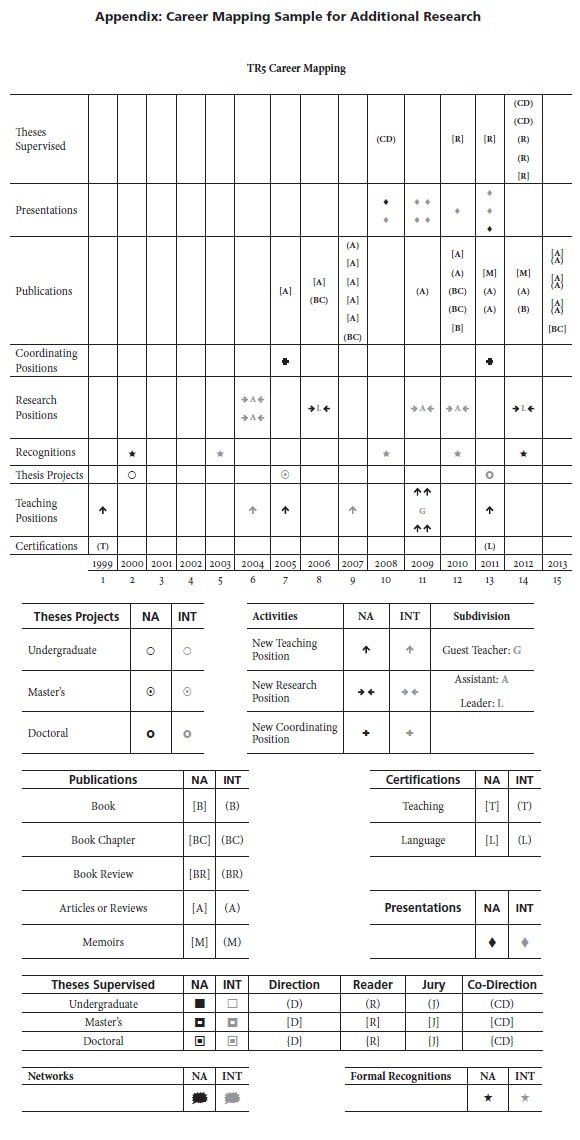
References
Baxter Magolda, M. B., & King, P. M. (2012). Assessing meaning making and self-authorship: Theory, research and application. San Francisco, CA: The ASHE Higher Education Report.
Bebeau, M. J., & Monson, V. (2011). Authorship and publication practices in the social sciences: Historical reflections on current practices. Science and Engineering Ethics, 17(2), 365-388.
Carrasco, A., & Kent, R. (2011). Leer y escribir en el doctorado o el reto de formarse como autor de ciencias [Reading and writing during doctoral studies or the challenge of becoming an author in the sciences]. Revista Mexicana de Investigación Educativa, 16(51), 1227-1251.
Carrasco, A., Kent, R., & Keranen, N. (2012). Learning careers and enculturation: Production of scientific papers by PhD students in a Mexican physiology laboratory: An exploratory case study. In C. Bazerman, C. Dean, J. Early, K. Lunsford, S. Null, P. Rogers, & A. Stansell (Eds.), International advances in writing research: Cultures, places, measures (pp. 335-351). Fort Collins, CO: The WAC Clearinghouse and Parlor Press. Available at http://wac.colostate.edu/books/wrab2011/.
Crawford, T. (2010). ESL writing in the University of Guanajuato: The struggle to enter a discourse community. Guanajuato, MX: Universidad de Guanajuato.
Creswell, J. W. (1998). Qualitative inquiry and research design. Thousand Oaks, CA: Sage.
Creswell, J. W. (2003). Research design: Qualitative, quantitative, and mixed methods approaches. Los Angeles, CA: Sage.
Higgins, M. C., & Kram, K. E. (2001). Reconceptualizing mentoring at work: A developmental network perspective. Academy of Management Review, 26(2), 264-288.
Ibarra, H. (1999). Provisional selves: Experimenting with image and identity in professional adaptation. Administrative Science Quarterly, 44(4), 764-791.
Ibarra, H., & Deshpande, P. H. (2007). Networks and identities: Reciprocal influences on career processes and outcomes. In H. Gunz & M. Peiperl (Eds.), Handbook of career studies (pp. 268-283). Thousand Oaks, CA: Sage. http://dx.doi.org/10.4135/9781412976107.n14.
Johnson, K. E. (2009). Second language teacher education: A sociocultural perspective. New York, NY: Routledge.
Johnson, K. E., & Golombek, P. R. (2002). Teachers’ narrative inquiry as professional development. New York, NY: Cambridge University Press.
Johnson, K. E., & Golombek, P. R. (2011). The transformative power of narrative in second language teacher education. TESOL Quarterly, 45(3), 486-509.
Kegan, R. (1994). In over our heads: The mental demands of modern life. Cambridge, MA: Harvard University Press.
Kegan, R., & Lahey, L. L. (2009). Immunity to change: How to overcome it and unlock the potential in yourself and your organization. Boston, MA: Harvard Business School Press.
Kellogg, R. T. (2008). Training writing skills: A cognitive developmental perspective. Journal of Writing Research, 1(1), 1-26.
Lave, J. (2011). Apprenticeship in critical ethnographic practice. Chicago, IL: University of Chicago Press.
Lillis, T., & Curry, M. J. (2010). Academic writing in a global context: The policies and practices of publishing in English. New York, NY: Routledge.
Mora Pablo, I. (2013). Becoming an English teacher in Mexico. In M. M. Lengeling (Coord.), Entering into the EFL teaching profession: Stories of teacher socialization in Mexico (pp. 49-64). Puebla, MX: Benemérita Universidad Autónoma de Puebla.
Ojeda, R. L. (2012). Exploring the effect of an ELT MA Program on teachers’ professional development in Mexico (Unpublished master’s thesis). Benemérita Universidad Autónoma de Puebla, Mexico.
Overington, M. A. (1977). The scientific community as audience: Toward a rhetorical analysis of science. Philosophy and Rhetoric, 10(3), 143-164.
Ramírez-Romero, J. L. (2009). Estado del conocimiento de las investigaciones sobre enseñanza y aprendizaje de lenguas extranjeras en México [State of the art research on teaching and learning of foreign languages in Mexico]. Revista Iberoamericana de Educación, 51(1), 1-12.
Ramírez-Romero, J. L. (Coord.). (2010). Las investigaciones en la enseñanza de lenguas extranjeras en México, una segunda mirada [Research in foreign language teaching in Mexico: A second look]. Mexico City, MX: Cengage Learning, Universidad de Sonora, Universidad Autónoma de Morelos, Universidad Autónoma del Estado de Hidalgo.
Ramírez-Romero, J. L. (Coord.). (2011). Estado del conocimiento de las investigaciones sobre los procesos de enseñanza-aprendizaje de las lenguas extranjeras en México (2000-2011) [State of knowledge of the research on the processes of the teaching and learning of foreign languages in Mexico (2000-2011)]. In A. Ávila, A. Carrasco Altamirano, A. A. Gómez Galindo, M. T. Guerra Ramos, G. López Bonilla, & J. L. Ramírez Romero (Eds), Una década de investigación educativa en conocimientos disciplinares en México (2002-2011): matemáticas, ciencias naturales, lenguaje y lenguas extranjeras (pp. 297-341). Mexico: COMIE.
Reyes Cruz, M., & Hernández Méndez, E. (2014). Productividad y condiciones para la investigación: el caso de los profesores de lenguas extranjeras. Sinéctica, 6(42), 1-7. Retrieved from http://www.sinectica.iteso.mx/?seccion=articulo&lang=es&id=636_productividad_y_condiciones_para_la_investigacion_el_caso_de_los_profesores_de_lenguas_extranjeras.
Richards, J. C. (1989, June). Beyond training: Approaches to teacher education in language teaching. Presented at a workshop on Second Language Teacher Education. Macquarie University, Sydney.
Richards, J. C. (2011). Exploring teacher competence in language teaching. The Language Teacher, 35(4), 3-7.
Rogoff, B. (2003). The cultural nature of human development. Oxford, UK: Oxford University Press.
Sayer, P. (2007). Exploring options for Titulación in Licenciaturas in ELT in Mexico: A case study. MEXTESOL Journal, 31(1), 57-74.
Singh, G., & Richards, J. C. (2006). Teaching and learning in the language teacher education course room: A critical sociocultural perspective. Paper presented at the RELC International Conference on Teacher Education in Language Teaching, Singapore, Singapore.
Stake, R. E. (1995). The art of case study research. Thousand Oaks, CA: Sage.
Wallace, M. J. (1991). Training foreign language teachers: A reflective approach. New York, NY: Cambridge University Press.
Welfare, L. E., & Sackett, C. R. (2010). Authorship in student-faculty collaborative research: Perceptions of current and best practices. Journal of Academic Ethics, 8(3), 199-215.
Wenger, E. (1998). Communities of practice: Learning, meaning, and identity. Cambridge, UK: Cambridge University Press.
Vygotsky, L. S. (1978). Mind in society: The development of higher psychological processes. Cambridge, MA: Harvard University Press.
How to Cite
APA
ACM
ACS
ABNT
Chicago
Harvard
IEEE
MLA
Turabian
Vancouver
Download Citation
CrossRef Cited-by
1. Eva Estefania Trujeque-Moreno, Georgina Aguilar-González, Fatima Encinas-Prudencio. (2023). Mapping English Language Teacher-Researchers’ Collaboration and Networking Practices Throughout Their Professional Paths. Profile: Issues in Teachers' Professional Development, 25(1), p.33. https://doi.org/10.15446/profile.v25n1.94340.
Dimensions
PlumX
Article abstract page views
Downloads
License
You are authorized to copy and redistribute the material in any medium or format as long as you give appropriate credit to the authors of the articles and to Profile: Issues in Teachers' Professional Development as original source of publication. The use of the material for commercial purposes is not allowed. If you remix, transform, or build upon the material, you may not distribute the modified material.
Authors retain the intellectual property of their manuscripts with the following restriction: first publication is granted to Profile: Issues in Teachers' Professional Development.



